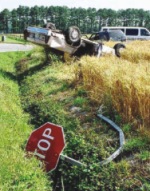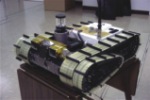|
Sci-tech
SUVs
Double Pedestrians' Risk of Death
 Someone struck
by a large sports utility vehicle is more than twice as
likely to die than someone hit by a saloon car travelling
at the same speed. The finding by American researchers will
add further weight to calls for SUVs -- sporty vehicles
with a high, blunt-fronted body atop a broad chassis --
to be made safer. Their high centre of gravity makes them
more likely to roll over. Half the passenger vehicles being
sold each year are now classed as light trucks and vans
(LTVs), a class that includes SUVs, pickups and light freight
vehicles. But no one has ever performed a broad analysis
of the risk the burgeoning LTV fleet poses to people on
the sidewalks, says Clay Gabler, a mechanical engineer specialising
in vehicle technology at Rowan University in Glassboro,
New Jersey. "Pedestrians are the forgotten crash victims,"
he says. "LTVs are heavier, stiffer and geometrically
more blunt than passenger cars and pose a dramatically different
type of threat to pedestrians," says Gabler. Research
found that all LTVs have a higher risk of injuring pedestrians
in an impact than cars. A pedestrian struck by a large van
is three times as likely to die as someone hit by a car
at the same speed. Pedestrians struck by large SUVs are
twice as likely to die. The probability of serious head
and thoracic injury is substantially greater than with a
car," says Gabler. As they are lower in profile, cars
tend to cause leg injuries, which are less likely to kill
than head injuries. Someone struck
by a large sports utility vehicle is more than twice as
likely to die than someone hit by a saloon car travelling
at the same speed. The finding by American researchers will
add further weight to calls for SUVs -- sporty vehicles
with a high, blunt-fronted body atop a broad chassis --
to be made safer. Their high centre of gravity makes them
more likely to roll over. Half the passenger vehicles being
sold each year are now classed as light trucks and vans
(LTVs), a class that includes SUVs, pickups and light freight
vehicles. But no one has ever performed a broad analysis
of the risk the burgeoning LTV fleet poses to people on
the sidewalks, says Clay Gabler, a mechanical engineer specialising
in vehicle technology at Rowan University in Glassboro,
New Jersey. "Pedestrians are the forgotten crash victims,"
he says. "LTVs are heavier, stiffer and geometrically
more blunt than passenger cars and pose a dramatically different
type of threat to pedestrians," says Gabler. Research
found that all LTVs have a higher risk of injuring pedestrians
in an impact than cars. A pedestrian struck by a large van
is three times as likely to die as someone hit by a car
at the same speed. Pedestrians struck by large SUVs are
twice as likely to die. The probability of serious head
and thoracic injury is substantially greater than with a
car," says Gabler. As they are lower in profile, cars
tend to cause leg injuries, which are less likely to kill
than head injuries.
Crashed
Cars Text Message for Help
 There
is no good place to have a car crash - but some places are
worse than others. In a foreign country, for instance, trying
to explain via cellphone that you are upside down in a ditch
when you cannot speak the local language can fatally delay
the arrival of the emergency services. If you are conscious
at all, that is. But an answer may be at hand. Researchers
funded by the European Commission are beginning tests of
a system called E-merge that automatically senses when a
car has crashed and sends a text message telling emergency
services in the local language that the accident has taken
place. The system was developed by ERTICO, a transport research
organisation based in Brussels, Belgium. Cars are fitted
with a cellphone-sized device attached to the underside
of the dashboard, which is activated by the same sensor
that triggers the airbag in a crash. The device includes
a cellphone circuit, a GPS positioning unit, a microphone
and loudspeaker. It registers the severity of the crash
by reading the deceleration data from the airbag's sensor.
Using GPS information, it works out which country the car
is in and from this it determines in which language to compose
an alert message detailing the precise location of the accident.
The device then automatically makes a call to the local
emergency service operator. If the car's occupants are conscious,
they can communicate with the operator via the speaker and
microphone. There
is no good place to have a car crash - but some places are
worse than others. In a foreign country, for instance, trying
to explain via cellphone that you are upside down in a ditch
when you cannot speak the local language can fatally delay
the arrival of the emergency services. If you are conscious
at all, that is. But an answer may be at hand. Researchers
funded by the European Commission are beginning tests of
a system called E-merge that automatically senses when a
car has crashed and sends a text message telling emergency
services in the local language that the accident has taken
place. The system was developed by ERTICO, a transport research
organisation based in Brussels, Belgium. Cars are fitted
with a cellphone-sized device attached to the underside
of the dashboard, which is activated by the same sensor
that triggers the airbag in a crash. The device includes
a cellphone circuit, a GPS positioning unit, a microphone
and loudspeaker. It registers the severity of the crash
by reading the deceleration data from the airbag's sensor.
Using GPS information, it works out which country the car
is in and from this it determines in which language to compose
an alert message detailing the precise location of the accident.
The device then automatically makes a call to the local
emergency service operator. If the car's occupants are conscious,
they can communicate with the operator via the speaker and
microphone.
Robots
To Change Their Shape
 Scientists
in New Hampshire have developed a new algorithm which would
make it feasible for robots to change their shapes and even
split into smaller parts to explore unfamiliar terrain.
According to New Scientist, Zack Butler and colleagues have
developed algorithms to control robots made from identical
components, each capable of moving on their own but also
able to attach to one another. These algorithms are the
first step towards using the power of modularity to work
in parallels. They could allow the use of modular robots
to perform parallel exploration, dividing up and recombining
to cover ground faster while still having the capability
of the original system," said Butler. After conducting
some preliminary testing using a modular lattice-shaped
robot developed at Dartmouth, called Crystal, researchers
are hopeful that such robots could eventually be used to
explore particularly treacherous and remote territories,
like the surface of another planet. However, Butler has
admitted that the construction of reliable robots might
not be an easy task. "Building robust modular hardware
is very difficult, especially for the challenging environments
in which they could have the biggest impact," he said. Scientists
in New Hampshire have developed a new algorithm which would
make it feasible for robots to change their shapes and even
split into smaller parts to explore unfamiliar terrain.
According to New Scientist, Zack Butler and colleagues have
developed algorithms to control robots made from identical
components, each capable of moving on their own but also
able to attach to one another. These algorithms are the
first step towards using the power of modularity to work
in parallels. They could allow the use of modular robots
to perform parallel exploration, dividing up and recombining
to cover ground faster while still having the capability
of the original system," said Butler. After conducting
some preliminary testing using a modular lattice-shaped
robot developed at Dartmouth, called Crystal, researchers
are hopeful that such robots could eventually be used to
explore particularly treacherous and remote territories,
like the surface of another planet. However, Butler has
admitted that the construction of reliable robots might
not be an easy task. "Building robust modular hardware
is very difficult, especially for the challenging environments
in which they could have the biggest impact," he said.
Internet
Addicts Suffer Withdrawal Symptoms
Withdrawal
symptoms are usually associated with alcohol or drug abuse,
but now a behavioural study carried out on 28 people by
Yahoo has revealed, that Internet addicts also suffer from
the same fate. The people who participated in the study,
meant for finding out how difficult life would be without
the net, complained that they felt lost and out of touch
with the world by missing on regular interaction with friends
and family members through e-mails and chats. "It was
a really hard thing to do. I thought I wasn't that Internet
dependent but I was kind of helpless - like an infant. I
got paid $700 - but I earned every penny of it," the
New York Daily News quoted Northwestern University senior
Russ Nelson, who took part in the study, as saying. Some
people, however rediscovered more traditional and technology
free lifestyles during their net withdrawal. David Armstrong
of Belmont, Massachusetts rediscovered the joys of reading,
but found the withdrawal symptoms too severe. "I can't
believe I'm looking forward to getting spam," he said.
"I had no idea how to get plane tickets through a travel
agent and look things up in the newspaper. Just going out
and buying a paper is difficult. I'm not used to paying
for goods and services. I'm used to getting everything for
free off the Internet," added Nelson. "I don't
remember how I did live in the city before I had Internet
access but I must have. I wouldn't go without it for 1,000
dollars," the report quoted Josh Weinberger, a freelance
editor in Manhattan, as saying.
Source:
The New Scientist.com / Webindia123.com / Google
Copyright
(R) thedailystar.net 2004
|
